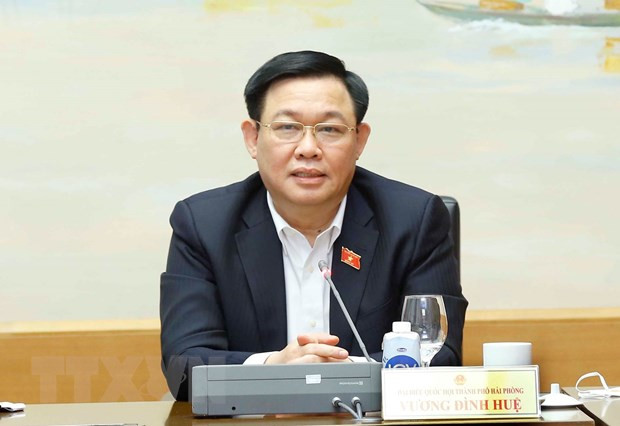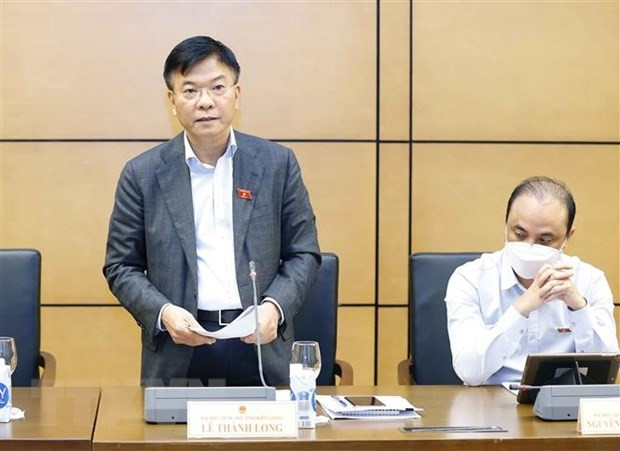The National Assembly Chairman affirmed that the draft Law on Intellectual Property is of good quality, basically meeting the requirements of international commitments, helping to create institutions and sanctions to better protect intellectual property.

National Assembly Chairman Vuong Dinh Hue speaks
On the afternoon of October 21, continuing the second session, the National Assembly listened to presentations, reports and discussed in groups the draft Law amending and supplementing a number of articles of the Law on Intellectual Property.
Create strong motivation for research and innovation
Presenting the draft Law, Minister of Science and Technology Huynh Thanh Dat stated that after 16 years of implementation since its promulgation in 2005, the Intellectual Property Law has played a role in regulating legal relations for this special type of property.
However, the current development context has changed a lot compared to 2005. Vietnam is no longer purely a country that "uses intellectual property" but is strongly shifting to a country that creates this property to serve the model of in-depth growth.
The amendments and supplements to the Intellectual Property Law in 2009 and 2019 were insignificant, did not create a strong driving force for research and innovation, and did not ensure a complete and effective legal corridor for the protection, exploitation and protection of intellectual property. Therefore, this amendment and supplement to the Intellectual Property Law is an urgent requirement for Vietnam's socio-economic development.
In this amendment, the Draft Law amends and supplements 92 articles (adds 12 articles, amends 80 articles) and abolishes 2 articles. The total number of articles of the Intellectual Property Law after amendment includes 232 articles.
Also in the Submission, the Government asked for the National Assembly's opinion on two main contents: the right to register inventions, industrial designs, and layout designs as a result of scientific and technological tasks using the state budget and administrative sanctions for acts of intellectual property rights infringement.
Examining the draft law, the National Assembly's Law Committee basically agreed on the plan to "automatically and without compensation grant the right to register to the presiding organization. The presiding organization has the right to own the invention, industrial design, and layout design when granted a protection certificate, except for subjects in the fields of national defense and security, which are still registered by state agencies."
However, the Law Committee recommends that this plan should be further reviewed and improved in the direction of supplementing and clarifying "the mechanism for reasonable division of benefits between the State, the presiding agency and the author."
At the same time, the drafting agency researched and expanded the mechanism for assigning similar ownership rights to plant varieties, some subjects of copyright and related rights; reviewed and proposed synchronous amendments to regulations on ownership rights of scientific and technological results using the state budget in current laws such as the Law on Science and Technology, the Law on Technology Transfer, and the Law on Management and Use of Public Assets to ensure the consistency of the legal system.
Regarding administrative sanctions for violations of intellectual property rights, the Law Committee proposes to maintain the provisions of the current law on the application of administrative sanctions for violations of intellectual property rights. One of the reasons is that the removal of administrative sanctions for violations of intellectual property rights in patents, industrial designs, and layout designs will lead to a legal gap in the timely detection, prevention, and handling of violations of the law.
Drafting Intellectual Property Law requires a lot of intelligence.
Giving his opinion at the group discussion on the Draft Law amending and supplementing a number of articles of the Law on Intellectual Property, National Assembly Chairman Vuong Dinh Hue assessed: "This is a difficult draft law, and since it is so difficult, drafting the Law on Intellectual Property requires a lot of intelligence for us to be able to make this law."
Therefore, the National Assembly agencies have listened very carefully to the opinions of all parties, especially the business community. Foreign enterprises are also very interested in amending and supplementing the draft Law on Intellectual Property of Vietnam.
The National Assembly Chairman affirmed that the draft law is of good quality, basically meeting the requirements of international commitments.
"At the same time, we have institutions and sanctions to better protect intellectual property, to encourage innovation and more start-up movements," the National Assembly Chairman emphasized.
Regarding the two issues the Government asked for opinions on, the National Assembly Chairman said that the National Assembly Standing Committee had discussed them very carefully. Regarding the content of transferring intellectual property rights, initiatives, projects... funded from the state budget, the National Assembly Standing Committee agreed with the plan to assign the agency in charge of implementation, also taking into account the mechanism of reasonable benefit sharing, needing to harmonize the interests between the State, the author and the agency in charge.
Regarding the issue of narrowing administrative penalties for industrial design rights, the National Assembly Chairman stated: "Through careful research, it is seen that for developing countries like Vietnam, it is very necessary to protect intellectual property, it must be more strict, even criminal penalties. Meanwhile, administrative penalties are convenient in that both the person being fined and the person being fined accept and resolve very quickly."

Minister of Justice Le Thanh Long, National Assembly Delegate of Kien Giang province, spoke.
Also at the group discussion session, regarding the narrowing of the scope of administrative handling in the field of intellectual property, delegate Tran Cong Phan (Binh Duong) said that the Summary Report on the implementation of the Law on Intellectual Property showed that the handling of disputes and infringements by civil measures in the Court only accounted for a very small proportion compared to tens of thousands of intellectual property infringement cases handled by administrative measures and focused mainly on disputes related to the field of copyright.
"Given the current situation, if we eliminate administrative sanctions for acts of infringement of rights related to patents, industrial designs, and layout designs, it will lead to a legal gap in promptly detecting, preventing, and handling violations of the law in the field of industrial property; increase the burden on the currently overloaded court system, as well as create more challenges for litigants when using civil proceedings," the delegate analyzed and proposed to keep the current regulations unchanged.
Delegate Le Minh Chuan (Quang Ninh) said that specific regulations on the right to register inventions, industrial designs, and layout designs as a result of scientific and technological tasks using the state budget are automatically granted to the host organization without compensation, and at the same time stipulate the State's reservation of rights in some cases as well as the obligations of the host organization.
Delegates said that such regulations are consistent with the Party's policy, encouraging individuals and organizations to use the state budget to register and establish intellectual property under state management.
According to Vietnam+